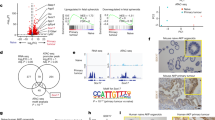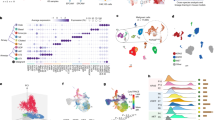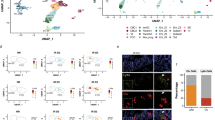Abstract
Little is known about the the signalling pathways driving the adenoma-to-carcinoma sequence in human colonic epithelial cells. Accumulation and activation of the src tyrosine kinase in colon cancer suggest a potential role of this oncogene in this early progression. Therefore, we introduced either activated src (m-src), polyoma-MT alone or combined with normal c-src in the adenoma PC/AA/C1 cell line (PC) to define the function and phenotypic transformations induced by these oncogenes in familial adenomatous polyposis (FAP) colonic epithelial cells. Functional expression of these oncoproteins induced the adenoma-to-carcinoma conversion, overexpression of the hepatocyte growth factor (HGF) receptor Met, but failed to confer invasiveness in vivo and in vitro, or to produce alterations in cell proliferation and differentiation. In contrast, PC-msrc cells became susceptible to the HGF-induced invasion of collagen gels and exhibited sustained activation of the pp60src tyrosine kinase and Tyr phosphorylation of the 120-kDa E-cadherin, which was further increased by HGF Transcripts of HGF were clearly identified by reverse transcription-polymerase chain reaction (RT-PCR) and Southern blot in the parental and transformed PC cells, suggesting an autocrine mechanism. Taken together, the data indicate that: (1) experimental activation of src and PyMT pathways directly induces tumorigenicity and Met upregulation in a colon adenoma cell line; (2) HGF-activated Met and src cooperate in inducing invasion; (3) in view of the molecular associations between catenins and cadherin or the tumour-suppressor gene product APC, the cell adhesion molecule E-cadherin may constitute a downstream effector of src and Met.
This is a preview of subscription content, access via your institution
Access options
Subscribe to this journal
Receive 24 print issues and online access
$259.00 per year
only $10.79 per issue
Buy this article
- Purchase on Springer Link
- Instant access to full article PDF
Prices may be subject to local taxes which are calculated during checkout
Similar content being viewed by others
Author information
Authors and Affiliations
Rights and permissions
About this article
Cite this article
Empereur, S., Djelloul, S., Di Gioia, Y. et al. Progression of familial adenomatous polyposis (FAP) colonic cells after transfer of the src or polyoma middle T oncogenes: cooperation between src and HGF/Met in invasion. Br J Cancer 75, 241–250 (1997). https://doi.org/10.1038/bjc.1997.40
Issue Date:
DOI: https://doi.org/10.1038/bjc.1997.40
This article is cited by
-
Learning about the functions of NME/NM23: lessons from knockout mice to silencing strategies
Naunyn-Schmiedeberg's Archives of Pharmacology (2011)
-
Autocrine induction of invasion and metastasis by tumor-associated trypsin inhibitor in human colon cancer cells
Oncogene (2008)
-
Induction of the adenoma-carcinoma progression and Cdc25A-B phosphatases by the trefoil factor TFF1 in human colon epithelial cells
Oncogene (2006)
-
Hepatic gene expression of NK4, an HGF-antagonist/angiogenesis inhibitor, suppresses liver metastasis and invasive growth of colon cancer in mice
Cancer Gene Therapy (2004)
-
Selective abrogation of the proinvasive activity of the trefoil peptides pS2 and spasmolytic polypeptide by disruption of the EGF receptor signaling pathways in kidney and colonic cancer cells
Oncogene (2003)



